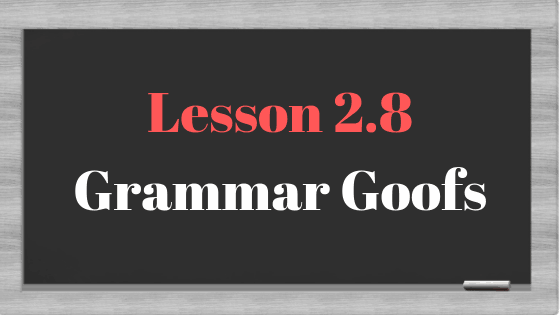When you read a blog post that’s full of grammatical errors do you make an assumption about the education of the owner of the blog?
Like it or not, words, spelling, and punctuation are powerful and can leave a lasting impression on your audience.
As a blogger, I’ve learned to appreciate writing, but learning about words that dangle, have double meanings, and get misplaced isn’t my idea of fun.
That being said there are certain grammatical goofs that any self-respecting blogger must stay away from in order to avoid alienating their audience.
Let’s begin with the most common goof of all:
#1. Your vs. You’re
The difference between these two is owning something versus actually being something:
Your is a possessive pronoun as in, “your blog” or “your baseball bat”.
You’re on the other hand, is a contraction of “you are.”
I walked two miles to your house.
You’re about two miles away from my house.
#2. They’re vs. Their vs. There
This might be second on the list, but it’s the one I personally struggle with the most.
They’re is a contradiction of “they are.” Their refers to something owned by a group, and there refers to a place.
I think most people understand the basic difference between the three, but because they sound the same it’s easy to use the wrong one without noticing.
They’re going to enjoy going there — I heard their funnelcakes are the best!
#3. Than vs. Then
When my parents brought me to America and I started learning English I used to have nightmares with this one. No matter how many times people explained the difference between these two to me, I would always guess and hope that no one noticed.
Now, I know that “than” is a conjunction that’s mainly used to make comparisons, whereas “then” is an adverb commonly used to situate actions in time.
This hammer is bigger than that one.
I made tacos, and then you ate them.
#4. It’s vs. Its
This is an easy grammar goof to avoid, but I see it all the time.
It’s is a contraction of “it is” or “it has, whereas its is a possessive pronoun.
The easiest way to avoid making a mistake with these words is by reading your sentence aloud — If it sounds silly, it’s probably wrong.
If its engine restarts, we’ll go to the movie.
It’s always windy in Chicago.
Saying “if it is engine restarts” sounds silly so automatically you know the correct word needed in this case.
#5. Affect vs. Effect
This is a tough one to figure out and one that many bloggers confuse.
Affect is a verb, as in:
Your ability to speak clearly will affect your quality of life.
Use affect when you’re talking about the act of changing or influencing something.
Effect, on the other hand, is most often a noun, as in:
“The effect of poor hygiene on a person’s quality of life is well documented.”
Use effect when you’re talking about the result of a change.
#6. To vs. Too
We’ve all accidentally left the second “0” off of “too” when trying fast. But in case you’re the type of blogger that goes beyond that, let’s review how each should be used.
“To” is normally used prior to a noun or verb, and describes a destination, recipient, or action.
Destination: Ana drove me to the baseball game.
Recipeint: I sent the paperwork to my coach.
Action: I’m going to dance reggae all nigh.
“Too,” on the other hand, is used as an alternative to “also” or “as well.” It can also be used to describe an adjective.
He, too, is a jerk.
There’s too much pressure on the gas tank.
#7. Fewer vs. Less
These two words basically mean the same thing.
However, if you can count it, use “fewer” and if you can’t, use “less.”
Rob has taken fewer swings since his wrist injury.
Rob has less incentive to swing the bat now.
#8. Lose vs. Loose
I know the difference between these two words, but I still mix them up because they’re spelled so similarly.
I see other bloggers mixing them up all the time as well, so just in case let’s clarify the differences between the two.
Lose is a verb that means “to fail to win, to misplace, or to free oneself from something or someone.”
Lose three games in a row in the NBA finals and you’re pretty much finished.
Loose, on the other hand, is an adjective that means “not tightly fastened, attached, or held.”
The loose shoe was easy to pull off.
#9. Complement vs. Compliment
These two words are pronounced exactly the same which might explain why they’re mixed up so often. However, their meanings have nothing to do with one another.
Complement refers to “a thing that completes or brings something to perfection.” Whereas compliment refers to “a polite expression of praise or admiration.”
Local veggies provide a perfect complement to the food.
Monica paid Warren a heartfelt compliment.
#10. Could of vs. Should of vs. Would of
“Could’ve,” “Should’ve,” and “Would’ve,” are verb contradictions that when spoken sound like they end in “of” (incorrect), instead of “have” (correct).
Incorrect: I could of signed to contract yesterday.Correct: I could’ve (could have) signed the contract yesterday.Incorrect: You should of called me yesterday.Correct: You should’ve (should have) called me yesterday.
Incorrect: Would of come earlier, but I got stuck in traffic.Correct: Would’ve (would have) come earlier, but I got stuck in traffic.
#11. Peek vs. Peak vs. Pique
Using these words incorrectly is another grammar goof that I see many bloggers make.
Peek refers to taking a look at something.
Roger took a sneak peak of the new film.
Peak refers to a sharp point.
The peak of Mount Everest is 29,035 feet above sea level.
Pique refers to a feeling of irritation or resentment resulting from a slight, especially to one’s pride.
Mark made some sly remarks to pique their curiosity.
#12. Who vs. That
This is one is tricky because in some instances these two are interchangeable.
However, who always refers to people. Whereas that can refer to people, animals, groups, or things.
Larry is the one who rescued the missing cat.
Larry is on the team that won the World Series.
In the first example, you could also use the word “that,” but because it’s referring to a person “who” is preferred.
However, “who” cannot replace “that” in the second example because it’s not referring to a person.
#13. Me vs. I
Most bloggers know the difference between these two until it comes time to use one in a sentence.
When you finish creating that infographic, can you send it to Mike and I?
The above sentence sounds right, but it’s not.
Try removing Mike from that sentence — it sounds awkward, right? You would never tell anyone to send something to “I” when they’re finished.
Do that when you’re unsure of which word to use and you’ll never make this mistake again.
#14. Alot vs. A lot vs. Allot
I hate to be the bearer of bad news but “alot” is not a word, yet I see many bloggers using it.
If you want to say that someone has a large number of things, you’d use “a lot.”
#15. The Dangling Participle
I didn’t know there was a name for this one until I started doing some research for this article.
I learned about “the dangling principle” from the grammar revolution website.
Below is their definition of the dangling principle:

For example:
Sitting on the park bench, the sun disappeard behind the clouds.
“Sitting on the park bench” is a dangling participle because there is no noun for it to modify.
Blow is the fix:
Sitting on the park bench, I watched the sun disappeard behind the clouds.
In this instance, “sitting on the park bench” modifies the pronoun I, so it’s not dangling anymore.
Conclusion
I understand that we’re all busy, and we all make mistakes.
However, there are a few common grammar goofs that make bloggers look silly.
In the above article, you’ll find out 15 of those mistakes and how to avoid them.
Bookmark this page and when in doubt come back to it to avoid making these grammar goofs and looking silly.
What grammar goofs are you guilty of committing?






